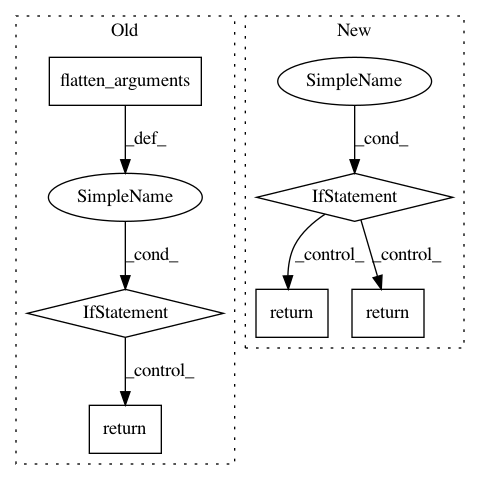eac38dbe9694bdfa6c2050528d8cc6a64747e933,pymanopt/autodiff/backends/_autograd.py,_AutogradBackend,compute_gradient,#_AutogradBackend#Any#Any#,38
Before Change
@Backend._assert_backend_available
def compute_gradient(self, function, arguments):
flattened_arguments = flatten_arguments(arguments)
if len(flattened_arguments) == 1:
return autograd.grad(function)
// XXX: This path handles cases where the signature hint looks like
// "@Autograd(("x", "y"))". This is potentially unnecessary as
// tests also pass if we instead use "@Autograd". Revisit this
// once we ported more complicated examples to autograd.
if len(arguments) == 1:
@functools.wraps(function)
def unary_function(arguments):
return function(*arguments)
return autograd.grad(unary_function)
// Turn `function` into a function accepting a single argument which
// gets unpacked when the function is called. This is necessary for
// autograd to compute and return the gradient for each input in the
// input tuple/list and return it in the same grouping.
// In order to unpack arguments correctly, we also need a signature hint
// in the form of `arguments`. This is because autograd wraps tuples and
// lists in `SequenceBox` types which are not derived from tuple or list
// so we cannot detect nested arguments automatically.
unary_function = unpack_arguments(function, signature=arguments)
return autograd.grad(unary_function)
@staticmethod
def _compute_nary_hessian_vector_product(function):
gradient = autograd.grad(function)
After Change
def compute_gradient(self, function, arguments):
num_arguments = len(arguments)
gradient = autograd.grad(function, argnum=list(range(num_arguments)))
if num_arguments > 1:
return gradient
return self._unpack_return_value(gradient)
@Backend._assert_backend_available
def compute_hessian_vector_product(self, function, arguments):
num_arguments = len(arguments)

In pattern: SUPERPATTERN
Frequency: 3
Non-data size: 6
Instances
Project Name: pymanopt/pymanopt
Commit Name: eac38dbe9694bdfa6c2050528d8cc6a64747e933
Time: 2020-02-01
Author: niklas.koep@gmail.com
File Name: pymanopt/autodiff/backends/_autograd.py
Class Name: _AutogradBackend
Method Name: compute_gradient
Project Name: pymanopt/pymanopt
Commit Name: 818492efd4238bd8fedcff105bd46044a714f762
Time: 2020-02-01
Author: niklas.koep@gmail.com
File Name: pymanopt/autodiff/backends/_pytorch.py
Class Name: _PyTorchBackend
Method Name: compute_gradient
Project Name: pymanopt/pymanopt
Commit Name: 4a28bbf9659d96e15f0f241bcab76381e299097c
Time: 2020-02-01
Author: niklas.koep@gmail.com
File Name: pymanopt/autodiff/backends/_tensorflow.py
Class Name: _TensorFlowBackend
Method Name: compute_gradient
